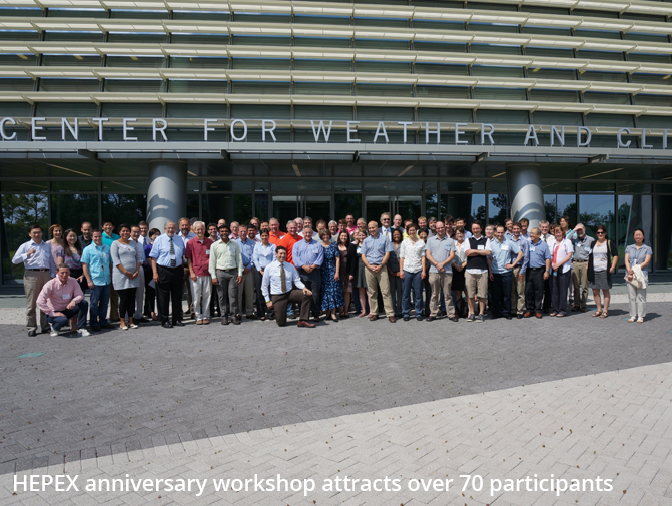

HEPEX 10th Anniversary Workshop, 24–26 June 2014, NOAA Center for Weather and Climate Prediction
In 2004, Tony Hollingsworth (then Head of Research at ECMWF), Roberto Buizza (ECMWF) and John Schaake (NOAA) initiated the Hydrological Ensemble Prediction Experiment (HEPEX). Ten years on, it has developed into a broad network of enthusiastic and devoted scientists, forecasting groups, and end-users helping to find unique and novel solutions to challenges in hydrologic forecasting.
Earlier research in the USA and Europe had explored the benefits of meteorological ensemble prediction systems for flood forecasting, and HEPEX set out to promote further interdisciplinary work between meteorologists and hydrologists, and to demonstrate how this type of information could improve decisions in the emergency management and water resources sectors that have important consequences for economy, public health and safety. The group’s work has greatly benefited recent projects such as the European Commission’s European Flood Awareness System (EFAS, developed by the Joint Research Center of Ispra) and the US National Weather Service’s Hydrologic Ensemble Forecast System (HEFS).
Hosted by the National Centers for Environmental Prediction (NCEP/NOAA) at their impressive new facilities in Maryland, USA, the 10th anniversary workshop opened with an address by Roberto Buizza, first co-chair of HEPEX from 2004 to 2007. The workshop brought together more than 70 participants from around the world, with a further 30 following the meeting online via a webcast and Twitter. Speakers presented state-of-the-art techniques and uses of ensemble predictions for floods, droughts and water resource management. Scientists and end-users shared their experiences during lectures, poster sessions, break-out groups, discussions and practical sessions with games about decision-making in the face of uncertain predictions.
HEPEX provides a great forum where meteorologists and hydrologists, modellers, forecasters and users can identify gaps, address key questions and develop forecasting methods and tools that can help users to manage meteo-hydro risk. The group shares their knowledge during meetings and workshops as well as through a blog-driven website, webinars and web interviews. ECMWF continues to take a leading role: Florian Pappenberger was co-chair between 2011 and 2014, a position that Fredrik Wetterhall has now taken on for the next 3 years.
HEPEX was inspired by research in the USA and Europe, and notably by projects such as the EU-funded European Flood Forecasting System (EFFS, 1999–2002), where the benefits of meteorological ensemble prediction systems for flood forecasting were explored for the first time in Europe. This anniversary workshop reviewed what has been achieved in the decade of hydrological probabilistic forecasting. Participants considered how we have learned to cope with the wealth of meteorological and hydrological data and which gaps still exist. A further question addressed was how to produce and communicate probabilistic information in a way that effectively helps decision-makers to take the best decision.
The workshop was co-organised by NOAA and the HEPEX co-chairs, with support and sponsorship from Irstea and Deltares and guidance from a multi-institution planning committee.
More information
- HEPEX website and workshop programme
- Irstea, National Research Institute of Science and Technology for Environment and Agriculture
- Deltares
